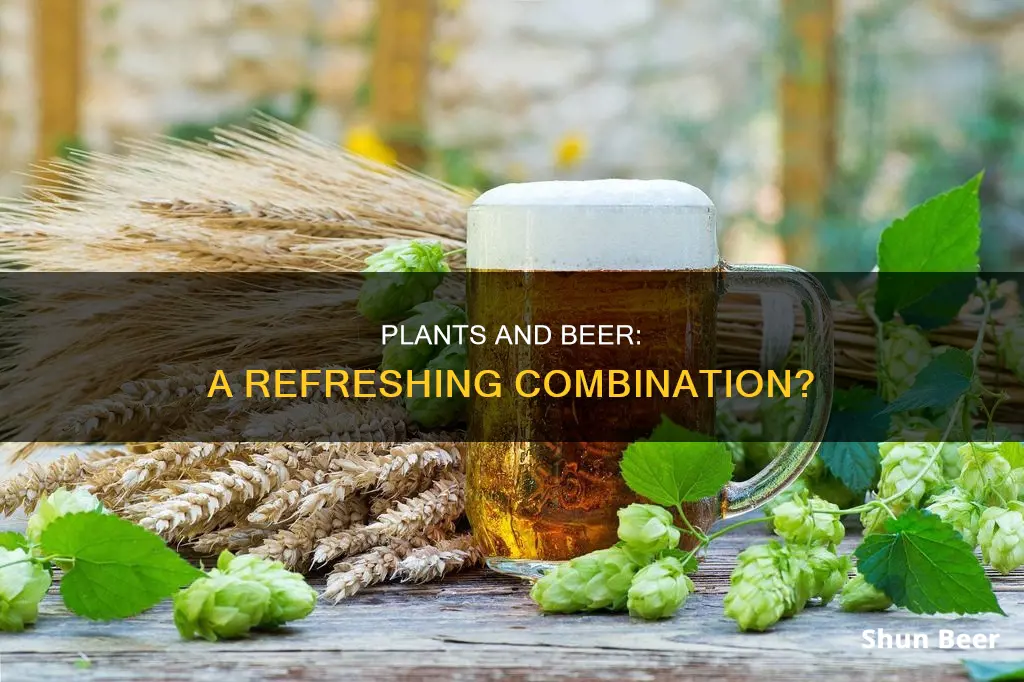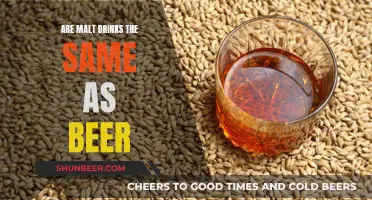
It's a well-known fact that plants need water to survive, but can they survive on other liquids? The idea of using beer to water plants is not a new one, and it's been around for a while. Beer contains yeast, carbohydrates, and about 90% water, so it might seem like a good idea to use it to water your plants. However, it's important to note that watering plants with beer can be expensive and unnecessary. While the acids in beer can kill fungi and pests, and the fermented sugars can feed the grass, it's not a substitute for water. So, can plants drink beer? While they may be able to tolerate small amounts of beer, it's not recommended as a substitute for water.
What You'll Learn

Beer can be used to fertilise plants
Beer contains yeast, potassium, calcium, magnesium, phosphorus, and carbohydrates, all of which can benefit plant growth. The acids in beer can also kill off fungi and pests. However, the carbohydrates in beer are simple sugars, whereas plants utilise complex carbohydrates. Additionally, adding yeast to the soil can cause the growth of fungus, which is accompanied by a nasty smell and does not aid in feeding your plant.
If you have leftover beer, you can pour it into your plant, but it is recommended to dilute it with water to avoid your house smelling like a brewery. It is also important to note that beer should be used sparingly and not every time you water your plants.
Drinking Beer on Manhattan Streets: Is It Legal?
You may want to see also

Beer is made up of 90% water
Beer is mostly water, about 90% to be precise. So, it makes sense that watering plants with beer could be a good idea. However, this is not necessarily the case. While beer does contain ingredients that are beneficial to plants, such as yeast, potassium, calcium, magnesium, and phosphorus, it also contains simple sugars that are not. The carbohydrates in beer are simple sugars, which are no better for plants than they are for people. In fact, plants utilise complex carbohydrates, so beer is not an effective fertiliser.
The yeast in beer is also a problem. Yeast is a type of fungus, and when added to the soil, it will grow and produce a nasty stench. This will not help feed your plants.
While beer is not a good substitute for water when it comes to plant care, it can still be used in other ways. For example, the acids in beer can kill off fungi and pests, and the fermented sugars can feed the grass. So, if you have leftover beer, you can pour it onto brown patches in your yard to help revive your lawn. Just be sure to dilute it with water first to avoid a strong smell.
Beer can also be used to control snails and slugs in your garden. Simply leave a bowl of stale beer out, and they will be attracted to it and drown. However, be sure to keep any beer out of the reach of children and pets, as it can be harmful to them.
Drinking Beer and Riding a Bike: Is It Safe?
You may want to see also

Beer contains yeast and carbohydrates
The carbohydrates in beer are simple sugars, which are not the type of carbohydrates that plants utilise. Plants need complex carbohydrates, so beer will not provide them with the nutrients they need to grow. In fact, the sugars in beer are more likely to attract insects and pests.
The yeast in beer is also not beneficial to plants. Yeast is a type of fungus, and when added to the soil, it will grow and produce a nasty stench. This will not help to feed the plant.
While beer may not be the best beverage to give to your plants, it can be useful in other ways. For example, the acids in beer can kill off fungi and pests, and diluted beer can be used to prevent their growth. Beer can also be used to attract and kill snails in the garden. However, it is important to keep beer out of the reach of children and pets, as it can be harmful to them.
Silverwood Lake's Beer Rules Explained
You may want to see also

Beer can kill fungi and pests
Beer can be used as a natural pest repellent. It is an effective DIY method to deter pests from your plants and garden. The acids in beer can kill off fungi and pests, and the fermented sugars feed the grass.
The sugars and the smell of the beer attract all kinds of pests, as sugar indicates a high nutritional value to many pests and insects, so they will be lured to drink it. However, beer does not sit well with many animals, and they will be trapped as they decide too late that beer is not good for them.
To make a DIY beer pest repellent, mix beer with water in a spray bottle. The mixture should be about three parts beer to one part water. Apply the mixture to the underside of the leaves in the evening when pest activity is highest. Reapply the mixture every two to three days.
Another option is to use beer bottle traps. Open a glass bottle of beer and drain out almost all the beer, leaving about an inch at the bottom. Place the bottle on its side in areas where there are pests, especially slugs. The slugs will be attracted to the scent and will enter the bottle.
Beer and Periods: Is It Safe to Drink?
You may want to see also

Plain water is the best option for irrigation
While it may be tempting to treat your plants to a tipple of beer, especially if you have some flat beer or leftovers, it is not the best option for your plants' health or your wallet. Plain water is the best option for irrigation.
Beer is mostly water, so it makes sense to assume that it could be a good substitute for watering your plants. However, it is an expensive alternative to plain water and is completely unnecessary. Water is life for plants, and they will never tire of it. It is also free and readily available from your tap.
Beer does contain some ingredients that could be beneficial to plants, such as yeast, potassium, calcium, magnesium, and phosphorus. The acids in beer can also kill fungi and pests. However, the carbohydrates in beer are simple sugars, which are no better for plants than they are for people. Yeast is also a type of fungus, and adding it to the soil will result in unwanted fungal growth and an unpleasant smell.
If you want to give your plants an extra treat, a shot of club soda is said to accelerate plant growth. You could also try using leftover coffee or milk, diluted with water, as an occasional supplement.
Tooth Extraction and Beer: What's Safe?
You may want to see also
Frequently asked questions
Yes, plants can drink beer.
Beer contains beneficial bacteria yeast, potassium, calcium, magnesium, and phosphorus, which are all elements plants need to thrive. However, beer is expensive and not as effective as water, which is still the best (and least expensive) option for irrigating plants.
Only a small amount of beer is needed to fertilise a plant. It is recommended to dilute the beer with water to avoid your house smelling like a brewery.
No, plants do not have a nervous system, so they cannot get drunk.
It is not recommended to give plants hard liquor as it may attract insects and pests.







